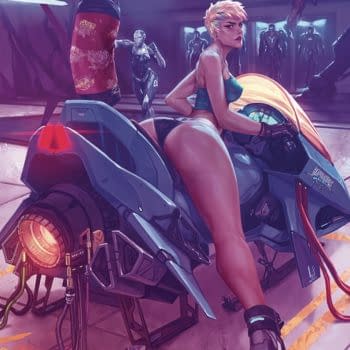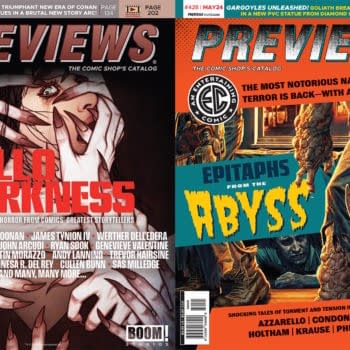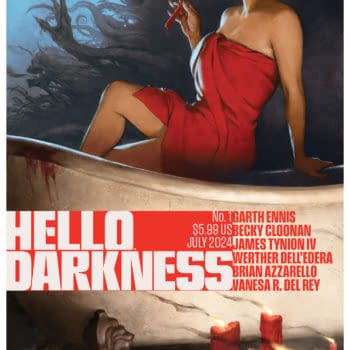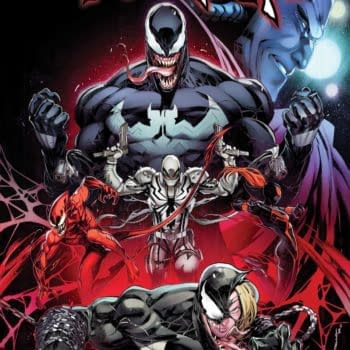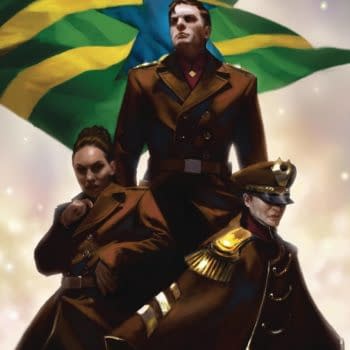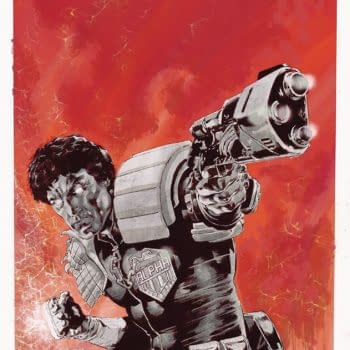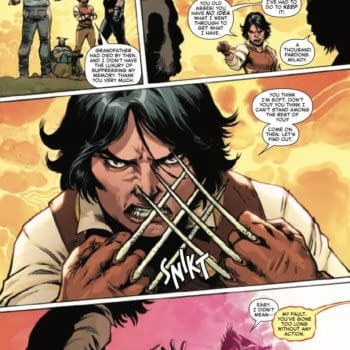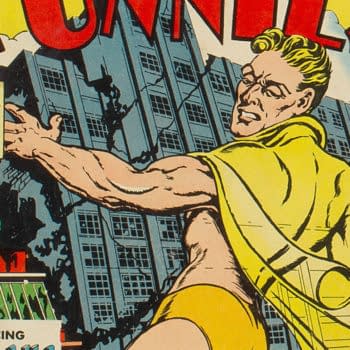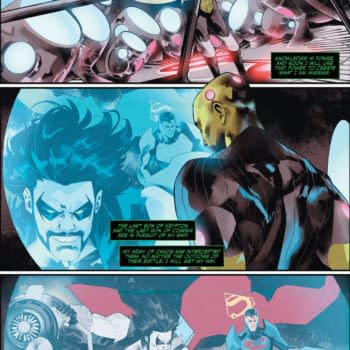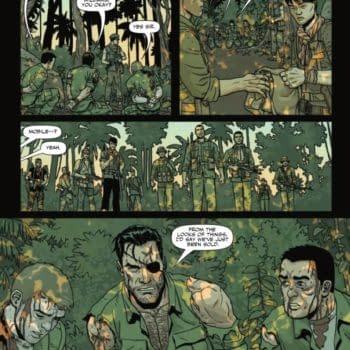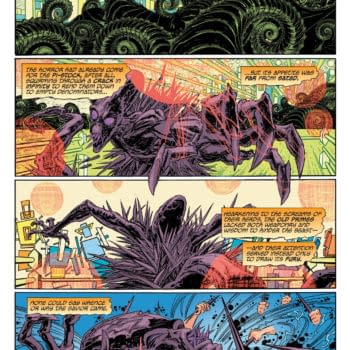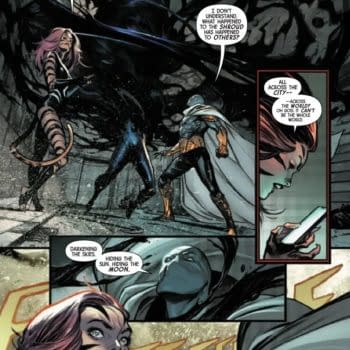Posted in: Comics | Tagged: boom, dark knight, dc comics, deathmatch, marvel, paul jenkins
The Bullying Of Creators – Paul Jenkins Talks About Leaving DC And Marvel For Boom
Last week, Paul Jenkins wrote an open letter about his decision to leave the likes of Marvel and DC behind and work exclusively on comic books through Boom! Studios. Lines like
I'm going to remove myself from working for the foreseeable future with Marvel or DC, and I'll be working exclusively from now on with BOOM! Studios. I'm finally going to make myself happy again in the process.
and
In recent years, I have watched, helpless, as editors made pointless and destructive changes to scripts and artwork that they had previously left alone. It bugs me that the creators were a primary focus when the mainstream publishers needed them, and now that the corporations are driving the boat, creative decisions are being made once again by shareholders.
and
So I am fully committing to working with BOOM! Studios, where I have already enjoyed more creative freedom in the last six or seven months than I can possibly articulate. Ross Richie has reanimated a beast that I had thought was extinct: namely, he has created an environment of trust between the creator and the editor. The culture of BOOM! is one that I admire; one that I miss terribly, and I can easily recognize: I told Ross recently that working with BOOM! reminds me of my days at Marvel Knights.
I thought I'd have a word.
Paul, you've worked at Mirage and Tundra in editorial, Marvel and DC as a writer, including recent small New 52 stints on Dark Knight and Stormwatch. What have you learned about how publishers do business, how has it changed, why is it something you're rejecting from Marvel and DC, and why do you believe that, in the end you'll do any better at Boom!
You know, I always felt I enjoyed a small advantage in that I sat on the publisher's side of the table in the creator/publisher relationship before I became a freelance writer. I was an editor or worked production for about six to seven years at Tundra and Mirage (and the short-lived Majestic!). It meant, perhaps, that I could understand what editors might need from me as a creator. It should be acknowledged, of course, that Tundra and Mirage were very different publishers from DC and Marvel. Nevertheless, I was privileged to be an editor for Neil Gaiman, Dave McKean, Alan Moore and others. It taught me a lot about the integrity of the best creators – they shared similar traits. And one of the most evident was the fact that they all stayed creatively true to themselves.
Perhaps I was spoiled but I simply believed that the quality of my work should speak for itself. I was lucky enough to be given a chance as the writer of Hellblazer in the mid Nineties, and that run lasted for five years. I was also lucky enough to be in the right place at the right time when working with the Marvel Knights imprint. But I think if anything, the lesson I am learning is that the creators' value is only equal to the needs of the publisher. When we did Inhumans we were given complete freedom. There was virtually no editorial interference whatsoever. Marvel needed us, and with virtually nowhere to turn they allowed Joe and Jimmy to bring in creators and give them the opportunity to do something interesting. That lasted for as long as it was needed – enough time to right the ship creatively, in my opinion. But at a certain point the entire focus behind Marvel Knights – that is, the support of the creator along with the creator's support of the publisher – shifted.
I will never forget what Bill Jemas once said during an early editorial meeting (Joe's first, actually): he told the editors to make great books, and that the marketing department's job would be to promote and sell those books. He told his staff to have courage, to believe in the quality of the work. He made it crystal clear that the marketing of the books would not trump the creative decisions. Well, that was all fine back in those heady days but I noticed a very obvious shift a number of years ago. And that shift, I can now see, coincided with Marvel's negotiations with Disney. So it really became about events and crossovers, and I am probably not their guy at that point. I have never been very interested in (not very good at) continuity laden crossovers. I find the self referential books to be dull. They are written into a corner, where the only payoff for the fans seems to be the setup for the next event. I don't want to do that kind of book. And I am pretty sure Marvel didn't want me to do that kind of book either.
Assuming you would want to go back to either publisher at some point, do you think this public announcement will close that door forever?"
My biggest concern with describing specific interactions between myself and a publisher – such as highlighting the editorial problems on Dark Knight – is that creators can look desperate or strident as they pull back the curtain on the misbehavior they are encountering. Editorial differences occur every day in the creative industries but rarely are they so profoundly driven by such egotistical arrogance on the part of the publisher. I have seen a few creators attempt to openly display their frustrations recently with DC, and I feel for them. Certain creators have tried to enlighten fans and media about the Machiavellian bullshit they are encountering, and I think those freelancers are a little freaked out that this is the new status quo. So I want to address this here.
I have a publishing relationship that has lasted for years with Marvel. It was not always a perfect relationship, as both Marvel and I are aware. But while we have not always seen eye to eye, my business with Marvel is between myself and the company. Fans would be correct to have an issue with me if I simply aired my day-to-day grievances publicly without having a good reason to do so. But DC is a different matter altogether. Why am I willing to describe certain specific events during my brief encounter with them for the New 52? Because I am appalled at the way in which creators are being bullied, and somewhat freaked out at the things I saw in my own time there. I encountered more lies and veiled threats – more attempts to justify dysfunctional behavior and systems – than I have ever encountered in my career. And believe me, I have been around a while and seen a lot, notably with Mirage and Tundra. In at least two obvious cases – once the editors responsible were found out – I received a "my bad" email with the assumption that we move on and sweep it all under the rug.


Some make the case that despite common perception, it's generally not the executives who screw over the talent, but it other talent doing it to each other the minute they get the chance. Do you subscribe to that?
No. There is an element – as there would be with any large group of people – of creators who are saboteurs, or who are self-serving, or who might try to advance their career at the expense of others. But what would you expect? Take a representative sample of car salesmen and you will find similar traits. The creators are not the culprit. That argument simply takes the 1% grain of truth and uses it to prove a point that does not exist.
The culprit, in my opinion, is the culture of the comic industry over the two and a half decades I have worked in it. When things are going poorly, the creators are most valuable. They are needed, so that they can pull the publishers arses out of the fire when creative bankruptcy sets in. When the business is doing well (and let's face it, the Avengers just made 1.4 billion dollars) then the creators are disposable. Frankly, why on Earth would Disney have a care about a small industry like comics when their core product is the film and merchandising? They would naturally be most concerned with character maintenance. I said recently to a fan at a convention that there's little chance DC would want a guy like me to write the Flash. I would have him lose a leg to a roadside bomb, then write about the personal issues that would naturally dominate his life for a while. If I pitched that, it would be rejected. But that is the kind of story I could have pitched in the Knights days, and which would have been accepted. Most fans have no idea of the amount of great ideas that are rejected simply because the character is busy in another series. I used to contradict continuity frequently on, say, my Peter Parker: Spider-Man run with Bucky, and that series is spoken of very fondly. If I pitched any of those stories now, they would never, ever fly. So did they become bad stories, or did the publishing concepts change?
Can you tell us any of the rejected ideas you refer to that you really wish had made it? What do you believe the effect of such thinking in the comics industry will be?
Hmm. The most notable example I can possibly give is the editor who told me (with a straight face) that if Alan Moore pitched a book like Watchmen now – the broken relationship being no factor – that DC would probably not publish it. Who am I to argue with that creative approach? Years ago at San Diego comic convention, Eddie Berganza tried to gauge my interest in writing the Superman title. I told him he would be unlikely to let me do what I thought had to be done: Lex Luthor holds a gun to Ma and Pa Kent's heads, asks Superman if he is "faster than a speeding bullet," and then blows their brains out. The idea being that the only way to get this untouchable, invincible character is to drive him crazy. Eddie blanched, of course, and said no. I told him it was okay because I was already doing that story with the Sentry.
Now some creators successfully straddle the divide. Si Spurrier writes X-Men Legacy for Marvel and Six Gun Gorilla for Boom. Mike Carey writes The Unwritten for DC and Suicide Risk for Boom…do you think they will eventually see the light and go your way?
Actually, I wrote frequently for both publishers for a long time. And all I heard was bitching and moaning about it. The bad blood between the two major publishers is just childish, and it affects creators' lives in a negative way. I don't want to work with DC or Marvel, at least not right now. I don't fit into what each publisher wants to do because sadly, we are not judged by the quality of our work as far as the publishers are concerned. We are judged by our our ability to adapt to what they want from us. Most damning is the lack of consequence to any of the stories that can be done right now. I am doing Deathmatch for BOOM! Studios right now, where a bunch of heroes and villains are killing each other. The characters can stay dead – in fact, that is a light-hearted requirement from me to the publisher. This is a book that has been enjoyed by the fans that see it. But it is also something that just cannot be done at DC or Marvel right now. No one stays dead. Spider-Man dies, then we look at our watches and he comes back in an "event." What other choice would Disney have?
Are you aware the Marvel title Avengers Arena? It has been compared to Deathmatch, and seems to be rather trigger happy with the characters it is killing off. With no sign or reason that they'll ever be resurrected. Do you really see a big difference between the two?
I'm aware of the title but I am not really qualified to speak about it much because I haven't read it. Sorry, I just don't have a pertinent comment to make.
Okay, back to the earlier point, some comic creators often switch from one publisher to another. Some make a fuss, but most don't. You're going further it seems, you're basically saying "screw Marvel and DC" or "a plague on both your houses" in favour of Boom! Alan Moore once told me he likes to overreact, to burn bridges, so that when he calms down he doesn't betray the man he was. Do you emphasise with that, or could there have been another way?
I am not sure about staying true to the man I want to be. Perhaps. I think it may depend upon what drives you as a creator. I am mostly driven by what I actually create. I am unsatisfied when I hand in work that I am fully behind, only to be edited by someone with no English language qualifications whatsoever. We employ far too many editors who are glorified project managers, and that diminishes the very good editors who contribute a lot to the book. I am only judged by the finished product. If the finished product is compromised by an editor whose sole qualification is that they have read a lot of comic books then I don't want to put my fate into their hands. A few years ago, the relationship between creators and editors changed. For the first portion of my career, editors would always chase creators – usually , this was to bring them back on schedule or ask for editorial changes. But sometime around 2005-2006, editors started avoiding communication. It got so ridiculous that at one point I called David Bogart at Marvel and told him, "Hey, this can't possibly work. I have an editor that needs something from me, so I write back with a logistical question and I have been chasing that editor for nine days!" The assistant editors were not calling back, nor following up on vital communications. They were for the most part, untrained and unqualified as far as I could ascertain. But the worst of it all was the lack of communication. Now in which business does a lack of communication makes sense? It was just infuriating.
Look, I feel this way: the fans are not getting what they want, and what they want to be paying for. This is a basic problem at the moment. But this is not me overreacting – this is me finally pressing SEND on the letter I have been wanting to send for a long time. I want to talk about what is going on right now in the comics industry because it disturbs me, and because I want to see the fans get what they intend to pay for. Let's look at this as cynically as possible: One might think this is done simply for the opportunity to self-promote. Well, look at my interactions with fans and my behavior over my career. Is it full of examples of self-promotion? If anything, my business partners and colleagues are often telling me I don't promote myself enough. Let's try a different tack: maybe I am simply being self-serving. Well, to what end? Let's not forget that sending an open letter refusing to play the big publishers' game is tantamount to career suicide, in some eyes. In the end, Rich, this comes down to the mistreatment of creators by certain elements in the business and also to a lack of respect for the paying audience. I can only address the second aspect by trying to do better work, and that work seems to lie outside of DC and Marvel right now.
Some will see this as sour grapes, that you've failed at Marvel with your last series there only partially published, and you've had little traction at DC. What evidence can you present that this is not the case?

DC is in the toilet right now. It reminds me of the way Marvel was just before we did Marvel Knights. I'll let you draw your own conclusions about the similarities and connections. Suffice it to say they have created a culture of dishonesty that affects too many creators. And the worst part of all is that they bully their creators. They tried to bully me, and I told them to go to Hell. The horror stories are many and varied. I have a few of my own, and I have heard way too many of them from various creators who are being beaten into submission with the threat of losing their jobs if they do not play ball. DC seem to have developed a culture where they think "professionalism" is screwing a creator in some fashion, and then pretending to be friendly at a convention. Professionalism is about handing in quality work on time, or about being friendly to fans at conventions, or about working towards a mutually beneficial goal. Professionalism is about dedication to your craft, not about running around the offices like a demented gerbil telling everyone how busy you are – so busy, in fact, that you forget to do any actual work. Here's what pisses me off about this situation: it does not take a rocket scientist to see that there are a lot of very unhappy creators at DC lately. Well, can you imagine how many more are unhappy that we don't know about because they feel if they speak out they will be blacklisted? Can you imagine the miserable conditions some of these creators are subjected to? (Disclaimer: not all creators, I am sure. Some are perfectly happy. Just not me.) The point is that DC has begun to act like a bully, to subject people to shitty working conditions as if it is doing them a favor. If I have seen good comics come from the creator/publisher collaboration, why the hell would I allow myself to be subjected to that nonsense at this stage of my career? I have numerous other interests, including film and video game work and my first novel.
Marvel is a different story. I would say it is a bit of a stretch to suggest I failed at Marvel, considering the success of my work there. Band of Heroes was cancelled during the worst economy in seventy years, where the publisher had every right to let go of a book that could not find its audience. Had it been finished, it would have been one of the works I was most proud of during my time at Marvel. I have had a long relationship with them but I rather think we are simply growing apart. I think they have a certain publishing plan that suits them well for this moment in time, and who am I to argue against it? They are having a lot of success, and more power to them. I am not particularly a crossover guy, and I am not fully versed in what is happening in each issue of the various series. I have a particular style that I feel works for me, and it probably doesn't fit Marvel right now.
Even at Boom!, the creator owned titles are more like creator participants, with Boom taking a slice of the media rights. Why Boom! over, say, Image or even Dark Horse of late? Or why Boom! over Avatar, Valiant or Dynamite?

In short, working with Boom fits my personality. They respect each other. They respect me. They respect the fans. When I am at shows, I love to meet the fans and I genuinely appreciate their support. I have never charged for a signature and I never will at a show. Boom's philosophies about respect, professional courtesy, and their genuine love of their jobs is reflected in the material they publish and in the way they conduct themselves personally. I am a father of two small boys. I want the industry to be more available to a wider audience, which I see coming from the Ka-Boom line. So the way I look at it, if I am happy and creatively fulfilled, why not stay at Boom?
It's not like Boom! don't have their own issues over creator rights. At the recent Phoenix Comic Con, Don Rosa was explicitly stating he wouldn't sign comics from Boom's Disney line because they refused to pay him for the use of his name on the books, whereas the likes of Edgmont did pay. Why do you think you won't end up in a similar position?
I don't know. Ask Ross. Or Filip Sablik. Or Matt Gagnon, Boom!'s editor-in-chief. Are they planning something?
That's when I start to get cease and desist letters. But why wait until after leaving DC Comics before talking openly about this kind of thing? Wouldn't it have made more impact when you were actually writing for the company?
A big concern in this is that the creators are freelancers – my income is derived, in part, from my comic work. So if I have put my time aside and secured a specific job, I need to finish that job while at the same time looking for other work. I happen to work in the video game field as well, and I'm writing my first novel at the moment. So while I don't rely solely on comics income, I rely on it for the duration of, say, a story arc that I am working on. These jobs are not simply interchangeable, unless I am prepared to take that financial hit. Also, I have never given up on a job without finishing it – I don't think I have that in me. Should I have quit the title? Perhaps an argument can be made but then again, perhaps it is better to finish out the work and move on.
—
And with that, Paul Jenkins got back on his horse, drank his juice, and heading back through the gates of Boomtown. He was never seen of again – well until the October solicitations in Previews under "B".







